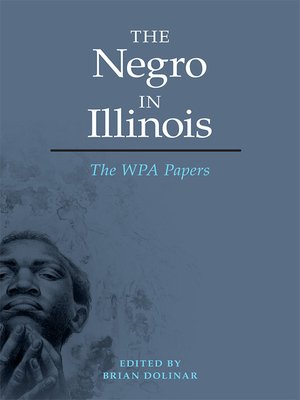
Sign up to save your library
With an OverDrive account, you can save your favorite libraries for at-a-glance information about availability. Find out more about OverDrive accounts.
Find this title in Libby, the library reading app by OverDrive.



Search for a digital library with this title
Title found at these libraries:
| Loading... |
A major document of African American participation in the struggles of the Depression, The Negro in Illinois was produced by a special division of the Illinois Writers' Project, one of President Roosevelt's Works Progress Administration programs. The Federal Writers' Project helped to sustain "New Negro" artists during the 1930s and gave them a newfound social consciousness that is reflected in their writing. Headed by Harlem Renaissance poet Arna Bontemps and white proletarian writer Jack Conroy, The Negro in Illinois employed major black writers living in Chicago during the 1930s, including Richard Wright, Margaret Walker, Katherine Dunham, Fenton Johnson, Frank Yerby, and Richard Durham. The authors chronicled the African American experience in Illinois from the beginnings of slavery to Lincoln's emancipation and the Great Migration, with individual chapters discussing various aspects of public and domestic life, recreation, politics, religion, literature, and performing arts. After the project was canceled in 1942, most of the writings went unpublished for more than half a century—until now. Working closely with archivist Michael Flug to select and organize the book, editor Brian Dolinar compiled The Negro in Illinois from papers at the Vivian G. Harsh Collection of Afro-American History and Literature at the Carter G. Woodson Library in Chicago. Dolinar provides an informative introduction and epilogue which explain the origins of the project and place it in the context of the Black Chicago Renaissance. Making available an invaluable perspective on African American life, this volume represents a publication of immense historical and literary importance.|
Cover
Title Page
Copyright
Contents
Acknowledgments
Editor's Introduction
Editor's Note
1. First, the French
2. Slavery
3. Abolition
4. The Underground Railroad
5. Lincoln and the Negro
6. John Brown's Friend
7. Leave a Summer Land Behind
8. Rising
9. Churches
10. Soldiers
11. Business
12. Work
13. Iola
14. The Migrants Keep Coming
15. The Exodus Train
16. Slave Market
17. Professions
18. Health
19. Houses
20. Social Life and Social Uplift
21. Recreation and Sports
22. Defender
23. Politics
24. What is Africa To Me?
25. And Churches
26. Literature
27. Music
28. The Theater
29. Rhythm
Bibliography
Editor's Afterword
Editor's Notes
Editor's Works Cited
Index
|"An exciting act of scholarly recovery. The Negro in Illinois papers, at long last available, are an invaluable guide to the role of American writers in crafting one of the first composite narratives of African American life. This dynamic volume shows us history from below in the making and being made."—Bill V. Mullen, coeditor of Afro Asia: Revolutionary Political and Cultural Connections between African Americans and Asian Americans
"This landmark study provides a unique window onto the work of the Illinois unit of the Federal Writers' Project. A commendable work of historical recovery."—Richard Courage, coauthor of The Muse in Bronzeville: African American Creative Expression in Chicago, 1932-1950
"A significant accomplishment. Not only does it bring to light a range of wonderful material on a variety of topics (the Underground Railroad, work, churches, professions, social life, and social uplift, literature, music, the theater, etc.), but the wonderful introduction and Dolinar's fine editing skills also make the book a significant contribution to scholarship."—The Annals of Iowa
| Brian Dolinar teaches in the department of African American studies at the University of Illinois at Urbana-Champaign and is the author of The Black Cultural Front: Black Writers and...
"This landmark study provides a unique window onto the work of the Illinois unit of the Federal Writers' Project. A commendable work of historical recovery."—Richard Courage, coauthor of The Muse in Bronzeville: African American Creative Expression in Chicago, 1932-1950
"A significant accomplishment. Not only does it bring to light a range of wonderful material on a variety of topics (the Underground Railroad, work, churches, professions, social life, and social uplift, literature, music, the theater, etc.), but the wonderful introduction and Dolinar's fine editing skills also make the book a significant contribution to scholarship."—The Annals of Iowa
| Brian Dolinar teaches in the department of African American studies at the University of Illinois at Urbana-Champaign and is the author of The Black Cultural Front: Black Writers and...






